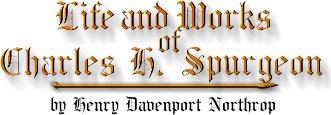
|
BOOK I. |
|
THE year 1856 was a remarkable one in the life of Mr. Spurgeon. It was the year
in which he preached his grandfather's jubilee sermon, and one of the centenary sermons
in Whitfield's Tabernacle in Tottenham Court Road.
During the first week of the year Mr. Spurgeon was delighting large audiences at
Bath. The second week was made memorable by a service held in his own chapel, in
which the young people, more particularly, took a very lively interest. Early in
the forenoon of January 8th Mr. Spurgeon was married to Miss Susanna Thompson, daughter
of Mr. Robert Thompson, of Falcon Square, London. Twin boys, Charles and Thomas Spurgeon,
are the only additions to their family. Both are now settled pastors.
At this period Mr. Spurgeon was daily in the pulpit often travelling many miles between
the services held; and for months together he preached twelve sermons weekly, with
undiminished force and unflagging zeal. In the achievement of such [gigantic] tasks
he has doubtless been indebted to an excellent constitution and to his simple habits
of living. He is the very embodiment of nature, without the usual make-up of art.
He throws himself on the tide of social intercourse with the freedom of one who has
no tricks to exhibit and no failings to conceal. He is one of the most pleasant of
companions: pious without any of the shams of piety; temperate without a touch of
asceticism; and devout without the solemnity of the devotee. Preaching for his poorer
brethren in the country, he declined to receive any contribution towards his personal
outlay, excepting only in cases where the Church could well afford to pay his travelling
expenses.
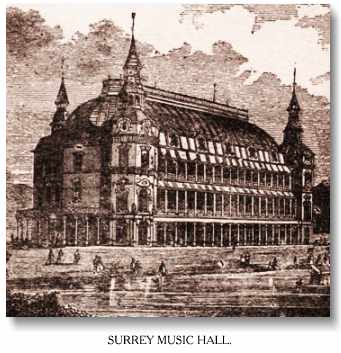 Preaching in Surrey Music Hall.
Preaching in Surrey Music Hall.
New Park Street Chapel when enlarged soon be came utterly inadequate to receive the
crowds which flocked to hear Mr. Spurgeon, and the deacons found it necessary to
take the largest available building in London-- the Royal Surrey Gardens Music Hall--
and in October, 1856, Mr. Spurgeon commenced to preach every Sabbath in that vast
audience-room, continuing the morning service there till the great Metropolitan Tabernacle
was opened.
What is known as the Surrey Gardens catastrophe we need not do more than allude to.
On October 19th a sad and fatal accident had wellnigh put an end to the large Sabbath
gatherings drawn to hear Mr. Spurgeon; but that fatality was overruled for good.
Previous to this Mr. Spurgeon knew not what illness was, but this calamity, joined
with the wicked calumnies of a portion of the press, laid prostrate even the strong
man.
In October, 1856, the first meeting was held for considering the steps necessary
to be taken for erecting a great Tabernacle. The proposal was very heartily taken
up by Mr. Spurgeon's friends and in every part of the country sympathy was largely
shown with the movement. There were many who laughed at the idea of erecting as a
place of worship an edifice to hold five thousand persons. Regardless of these objections
the work went on, Mr. Spurgeon travelling all over the land, preaching daily, until
the promise of half the proceeds of the collection being devoted to the new Tabernacle.
The foundation-stone of the great building was laid by Sir Samuel Morton Peto, August
16, 1859.
Strange Place for a Prayer Meeting.
During the progress of the work Mr. Spurgeon met on the ground, one evening after
the workmen had left [with] one of his deacons. After some consultation and meditation,
surrounded by planks, piles of timber and bricks, in the dim twilight, they both
knelt down where no eye could see them but that of God; and with only the canopy
of heaven for their covering, the pastor and his friend each poured out most earnest
supplications for the prosperity of the work, the safety of the men engaged on the
building, and a blessing on the church. Their prayers were not offered in vain, but
were abundantly answered. Out of so large a number of men engaged on the work, not
one of them suffered harm.
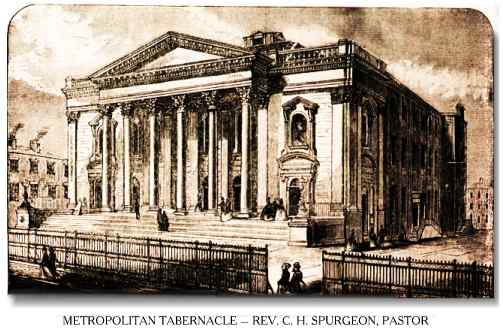 In 1860 a large and enthusiastic
meeting was held in the building before it was finished, at which much money was
given and more promised. Great preparations were made during the winter for the holding
of a large bazaar in the spring, which was probably one of the largest and most productive
of the kind ever held in London. the opening services were commenced on March 25,
1861, and were continued without interruption for five weeks. As the result of all
these efforts, the great Tabernacle, to hold five thousand people, was free from
debt at the end of the special services, and $155,000 of free-will offerings had
been poured into the hands of the treasurer. Since then various improvements have
been made in the audience-room, and, using every facility modern invention could
suggest, seats have been provided for 5,500 persons and standing room for 1,000 more--
total, 6,500.
In 1860 a large and enthusiastic
meeting was held in the building before it was finished, at which much money was
given and more promised. Great preparations were made during the winter for the holding
of a large bazaar in the spring, which was probably one of the largest and most productive
of the kind ever held in London. the opening services were commenced on March 25,
1861, and were continued without interruption for five weeks. As the result of all
these efforts, the great Tabernacle, to hold five thousand people, was free from
debt at the end of the special services, and $155,000 of free-will offerings had
been poured into the hands of the treasurer. Since then various improvements have
been made in the audience-room, and, using every facility modern invention could
suggest, seats have been provided for 5,500 persons and standing room for 1,000 more--
total, 6,500.
Immense Congregations.
Large as is the accommodation provided, the Tabernacle has always been filled. All
the prophets of evil have been found false prophets, and the spirit of faith with
which the work was begun has had its full reward greater than ever had been anticipated.
When the church removed from New Park Street, in 1861, it numbered 1,178 members.
In ten years from the commencement of his ministry Mr. Spurgeon has received into
fellowship by baptism 3,569 persons.
During the period in which Mr. Spurgeon was preaching in the Surrey Music Hall large
numbers of the aristocracy attended his ministry; amongst whom were Lord Chief Justice
Campbell, the Lord Mayor and Sheriffs of London, Earl Russell, Lord Alfred Paget,
Lord Panmure, Earl Grey, Earl Shaftesbury, the Marquis of Westminster, the Duchess
of Sutherland, Lord Carlisle, Earl of Elgin, Baron Bramwell, Miss Florence Nightingale,
Lady Rothschild, Dr. Livingstone, and many other persons of learning and distinction,
some of whom sought and obtained interviews with the preacher. It was during that
interim that Mr. Spurgeon paid one of his visits to Holland, was privileged to preach
before the Dutch Court, and had a lengthened interview with the queen of that country.
It was reported that some members of the English Royal Family also occasionally attended
on his preaching, and not a few distinguished clergymen and professors.
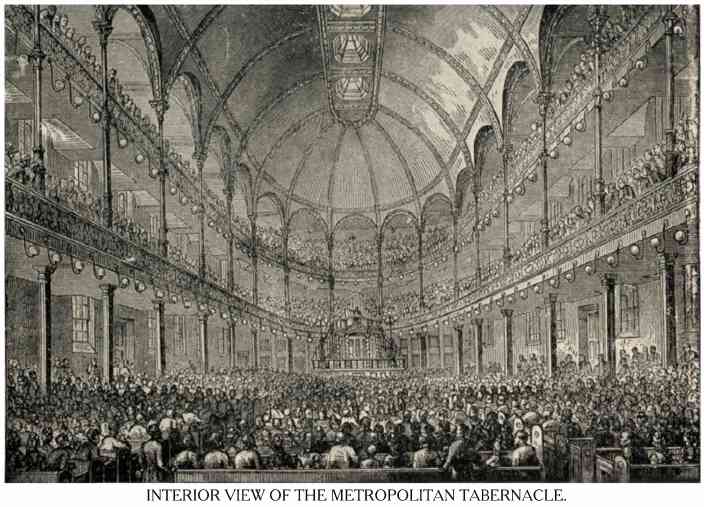
Gladstone and Spurgeon.
On one occasion Mr. Gladstone and his son formed part of the congregation, and a
mutual interview was held at the close of the service between the great premier and
the humble pastor. Mr. Gladstone has often spoken very highly of Mr. Spurgeon, calling
him "the last of the Puritans." During Mr. Spurgeon's illness in 1891,
Mr. Gladstone, in a letter to Mrs. Spurgeon, said:
"In my own home, darkened at the present time, I read with sad interest the accounts of Mr. Spurgeon's illness. I cannot help conveying to you an earnest assurance of my sympathy and of my cordial admiration, not only for his splendid powers, but still more for his devoted and unfailing character. I humbly commend you and him in all contingencies to the infinite stores of divine love and mercy."
Mrs. Spurgeon replied with a note of thanks, a postscript to which was traced by Mr. Spurgeon, as follows:
"Yours is a word of love such as those only write who have been into the King's country and seen much of his face. My heart's love to you."
Dr. Livingstone, the great African explorer, said, on one occasion after hearing
Mr. Spurgeon, that no religious service he ever remembered had so deeply impressed
his own mind as that he had witnessed and participated in that morning; adding, that
when he had retired again into the solitudes of Africa, no scene he had ever witnessed
would afford him more consolation than to recall the recollection that there was
one man God had raised up who could so effectively and impressively preach to congregated
thousands, whilst he should have to content himself by preaching to units, or at
most tens, under a tropical sky in Africa; implying at the same time, that Mr. Spurgeon's
sphere of religious influence was a hundred times greater than that of the great
and good traveller.
No Time To Lecture in America.
Mr. Spurgeon has often been invited to lecture in this country, but has always declined.
The managers of the Redpath Lyceum Bureau having noticed a paragraph in the Boston
papers stating that Mr. Spurgeon was about to visit the United States, enclosed it
to him and wrote as follows:
BOSTON, MASS., June 22, 1876.
DEAR SIR,-- Is the above paragraph true? We have tried so long and so hard for many years to secure you that we thought it impossible, and long since gave up all hope. We are the exclusive agents of all the leading lecturers in America. We will give you a thousand dollars in gold for every lecture you deliver in America, and pay all your expenses to and from your home, and place you under the most popular auspices in the country. Will you come?
To this invitation Mr. Spurgeon returned the following reply-
CLAPHAM, LONDON, ENGLAND, July 6.
GENTLEMEN,-- I cannot imagine how such a paragraph should appear in your papers, except by deliberate invention of a hard-up editor, for I never had any idea of leaving home for America for some time to come. As I said to you before, if I could come, I am not a lecturer, nor would I receive money for preaching.
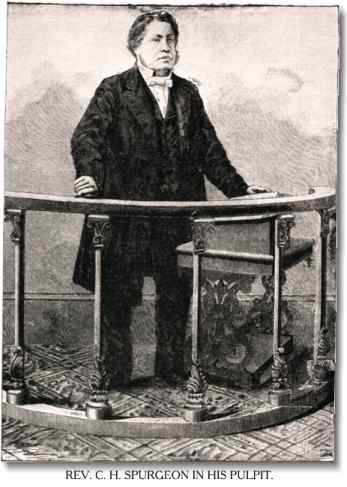 In the year
1857 Mr. Spurgeon preached two sermons-- one in the ordinary course of his ministrations,
the other on a special occasion-- both of which commanded a sale of more than a hundred
thousand copies. The first, preached in the autumn, was entitled "India's Ills
and England's Sorrows," and had reference to the mutiny in India. The second
was preached in the Crystal Palace at Sydenham on the fast day relating to the war
in India, when probably not less than twenty thousand formed the preacher's audience.
In the year
1857 Mr. Spurgeon preached two sermons-- one in the ordinary course of his ministrations,
the other on a special occasion-- both of which commanded a sale of more than a hundred
thousand copies. The first, preached in the autumn, was entitled "India's Ills
and England's Sorrows," and had reference to the mutiny in India. The second
was preached in the Crystal Palace at Sydenham on the fast day relating to the war
in India, when probably not less than twenty thousand formed the preacher's audience.
Marvellous Gifts.
It will doubtless interest many to learn something of the personal appearance of
the preacher as he stood before that vast audience. One who had some skill in depicting
natural life wrote of him as follows:
"He is of medium height, at present quite stout, has a round and beardless face,
not a high forehead, dark hair, parted in the centre of the head. His appearance
in the pulpit may be said to be interesting rather than commanding. He betrays his
youth, and still wears a boyish countenance. His figure is awkward-- his manners
are plain-- his face (except when illumined by a smile) is admitted to be heavy.
His voice seems to be the only personal instrument he possesses, by which he is enabled
to acquire such a marvellous power over the minds and hearts of his hearers. His
voice is powerful, rich, melodious, and under perfect control. Twelve thousand have
distinctly heard every sentence he uttered in the open air, and this powerful instrument
carried his burning words to an audience of twenty thousand gathered in the Crystal
Palace. 'Soon as he commences to speak,' says an English critic, 'tones of richest
melody are heard. A voice, full, sweet, and musical, falls on every ear, and awakens
agreeable emotions in every soul in which there is a sympathy for sounds. That most
excellent of voices is under perfect control, and can whisper or thunder at the wish
of its possessor."
"Then there is poetry in every feature and every movement, as well as music
in the voice. The countenance speaks, the entire form sympathizes. The action is
in complete unison with the sentiments, and the eye listens scarcely less than the
ear to the sweetly flowing oratory.' To the influence of this powerful voice he adds
that of a manner characterized by great freedom and fearlessness, intensely earnest,
and strikingly natural. When to these we add the influence of thrilling description,
touching anecdotes, sparkling wit, startling episodes, striking similes, all used
to illustrate and enforce the deep, earnest home-truths of the Bible, we surely have
a combination of elements which must make up a preacher of wonderful attraction and
of marvellous power."
Pastors' College.
Amidst his incessant duties and almost daily journeys and sermons, the devoted pastor
still found time to give instruction to the young men he kept under his careful ministry.
With Mr. Spurgeon it was work almost night and day, and all day long, with but little
intermission, for several years in succession. The germs of what is now known as
Pastors' College were never absent from his mind, and frequently occupied his attention
when in London. In 1857 the first student was sent out in charge of a church; in
1858 Mr. Silverton went forth; in 1859 Mr. Davies and Mr. Genders followed, both
of whom have left their mark on society.
On Jan. 1, 1865, appeared the first number of "The Sword and the Trowel;"
a record of combat with sin, and labor for the Lord. It had an ornamental cover representing
a Jewish doorway of stone, and beyond and within were seen the zealous Jews at work
rebuilding the walls of Jerusalem, the sword in one hand, the trowel in the other,
the work was so wisely planned, and it has been so ably conducted, that it now occupies
a prominent, if not a foremost place amongst the periodical literature of the land,
and has a circulation of several thousand copies monthly, with a steady advancement.
Literary Labors.
Besides the other works daily undertaken by Mr. Spurgeon himself, and all his journeys
in the country to preach special sermons, he found time to write no less than nineteen
articles for the first year's volume. At the end of the year the editor was ill at
home, but he informed his friends, through the magazine, that he had finished writing
his new book, "Morning by Morning," which means he hoped to hold hallowed
communion with thousands of families all over the world, every morning at the family
altar. He has since added to it a companion volume, "Evening by Evening,"
both of which works have had large sale. Amongst his articles in 1865 were two poems,
one entitled "The Fall of Jericho;" the other will find a fitting place
in these pages. It was written while on a visit to Hull, in Yorkshire, during the
summer, and tenderly expresses the young pastor's love to his wife.
|
|
MARRIED LOVE- |
During the year 1865 Mr. Spurgeon held in the Tabernacle united meetings for prayer
through one entire week, attended by over six thousand persons, which were a source
of so much blessing to those attending them that a second series followed a month
later.
Revival Services.
Conscious of the power of prayer the pastor commenced the year 1866 with a month's
continuous revival services, at which one hundred and twenty ministers and students
were present. Knowing that he should have the sympathy and co-operation of his church
in conducting them, in September the whole church had a day of fasting and prayer.
An important work, which had for a long time occupied Mr. Spurgeon's attention, was
brought out this year, under the title of "Our Own Hymn Book." The preparation
of a new collection of psalms and hymns for congregational use was felt to be an
urgent necessity, but there was a nervous fear about the success of such a work.
It was prepared with great care, and no pains were spared to make it complete in
every respect, giving correct text, author's name to each hymn, with date of first
publication, and other interesting particulars in the large edition of the book.
The public at once saw the value of the collection, and since that time it has had
a very large sale, having been adopted by and is now in use in scores if not hundreds
of congregations.
Colportage Association.
As a student of the times in which Puritanism began to take hold of the mind of the
English people, Mr. Spurgeon knew how great a work was accomplished by the Nonconformists
by book hawking. He had learned by several visits to Scotland how useful and valuable
that agency was in the north of England. He therefore, in January, 1866, issued a
circular stating his intention to establish a system of colportage, by which his
sermons and other works of a moral and religious character might be more widely distributed.
At first it was intended to be confined to London and the neglected villages and
small country towns around, where access to religious literature was difficult. The
result of the appeal made in January led to the formation of THE COLPORTAGE ASSOCIATION
in October, which has ever since been one of the important agencies of the Tabernacle,
and which is every year increasing its operations and usefulness. It employs colporteurs,
whose whole time is directed to the work, anti who are paid a moderate salary; also
book agents, who are constantly delivering to purchasers, for which service they
receive a liberal discount on sales, and by which they are enabled to make a satisfactory
living. The wisdom of the course taken by Mr. Spurgeon in this matter has since been
abundantly demonstrated. That association has been a blessing to thousands, and has
done a noble work in very needy localities.
Not a Sectarian.
At this time there was a feeling abroad which manifested itself in several articles
in public papers, and notably in a New York religious weekly, that Mr. Spurgeon,
by means of his College and the large number of new chapels being erected all over
the land for his students, was aiming at founding a sect, after the example of Wesley.
So soon as this notion reached Mr. Spurgeon, he took the earliest opportunity of
repudiating the idea. In a short article entitled "Spurgeonism," he thus
records his views:
"There is no word in the world so hateful to our heart as that word Spurgeonism, and no thought further from our soul than that of forming a new sect. Our course has been, and we hope ever will be, an independent one; but to charge us with separating from the general organization of the religious world, and even of the Baptist denomination, is to perpetrate an unfounded libel. We preach no new gospel, we desire no new objects, and follow them in no novel spirit. We love Christ better than a sect, and truth better than a party, and so far are not denominational; but we are in open union with the Baptists for the very reason that we cannot endure isolation. He who searches all hearts knows that our aim and object is not to gather a band around self, but to unite a company around the Saviour. 'Let my name perish, but let Christ's name last forever,' said George Whitfield; and so has Charles Spurgeon said a hundred times.
We aid and assist the Baptist churches to the full extent of our power, although we do not restrict our energies to them alone, and in this those churches are far enough from blaming us. Our joy and rejoicing is great in the fellowship of all believers, and the forming of a fresh sect is work which we leave to the devil, whom it befits far more than ourselves. It is true that it has long been in our power to commence a new denomination, but it is not true that it has ever been contemplated by us or our friends. We desire as much as possible to work with the existing agencies, and when we commence new ones our friends must believe that it is with no idea of organizing a fresh community."
Work in Paris.
The closing days of the year 1866 Mr. Spurgeon spent in Paris, in a successful effort
to get the Baptist church in that city brought out of an obscure corner, in which
property could not be respected, into a place of prominence, where there was hope
of its becoming known and being useful. This effort had long exercised the mind of
Pastor Spurgeon, and he had the joy of seeing the work he aimed at fully accomplished.
He spent his Christmas in Paris, getting rest for himself and doing a good work for
the Parisians.
Reinvigorated by his short trip to the Continent, he returned to his duties at the
Tabernacle with renewed energy and a faith, having gained fresh courage from his
success in France.
The month of February, 1867, witnessed the usual week of prayer, which that year
was marked, on the 18th, by a whole day of fasting and prayer, commencing at seven
in the morning and continuing, without a pause or breaking up for meals, until nine
at night-- a day of prayer, in which the Holy Spirit was manifestly present all day.
The account of the services held during that week reads like a new chapter of the
Acts of the Apostles.
Reaching the Common People.
The readiness with which Mr. Spurgeon can adapt himself to his audience, whether
that audience consists of the educated or affluent, the poor or the ignorant, was
never more distinctly seen than when, in the Evangelists Tabernacle, Golden Lane,
City, he preached to a congregation of costermongers. Mr. Orsman, the missionary
there, had distributed tickets among the street dealers in Whitecross Street, so
as to secure the class for whom the service was intended. An amusing article might
be written to describe the singular variety of countenances and callings of those
present. The hymns were heartily sung; the prayer won the hearts of the audience
when Mr. Spurgeon offered supplication for those who had bodily aches and pains,
and whose poverty deprived them of many desired comforts; many deep sighs followed
those prayers.
The sermon was preached from St. John. iv. 15, and it was illustrated by allusions
to the habits and manner of life of his congregation, whose acuteness relished the
anecdotes and homely hits which the preacher so freely used. A costermonger's living
depends much upon his voice. After the service the costers were free in their comments
on the preacher's voice, which was described as "Wot a woice!" "Wonderful!"
"Stunnin!" "I never!" "Would make a fine coster!" etc.
After the sermon about two hundred remained to be prayed with, and much spiritual
good was done that night.
Great Assemblies in Agricultural Hall
Six years having elapsed since the Tabernacle was opened, the building had suffered
such from the massive congregations which had assembled there, and it became necessary
to close it for several weeks for repairs. During that period Mr. Spurgeon preached
to immense congregations in the Agricultural Hall, Islington. The first of the five
special services was held on Sunday, March 24, 1867, when about twelve thousand persons
were present. The preacher's delivery was slow, measured, and emphatic; nothing labored;
and his voice lost none of its accustomed music. Many thousands heard the gospel
at that time who were not accustomed to attend any place of worship. More than twenty
thousand were in attendance on the final day.
The heavy responsibilities which rested on the pastor of the Tabernacle in the early
part of the year made it necessary for him to seek a little recreation, and with
that he blended a friendly service for his esteemed friend Pastor Oncken, by preaching
for him at the opening of his new Baptist church at Hamburg. He included in his travels
a visit to Heligoland, which furnished for his ready and fertile pen most interesting
matter for an article, which contains information both curious and valuable, not
to be found elsewhere.
.
|
|
|
|
||
.
Homepage Holy Bible
.Jehovah Jesus
Timeline
.Prophecy
Philadelphia
Fellowship
Promises
Stories
Poetry
Links
Purpose ||.What's New
|| Tribulation Topics || Download Page || Today's Entry
Topical Links:
Salvation || Catholicism || Sound Doctrine || Prayer
Privacy Policy
.